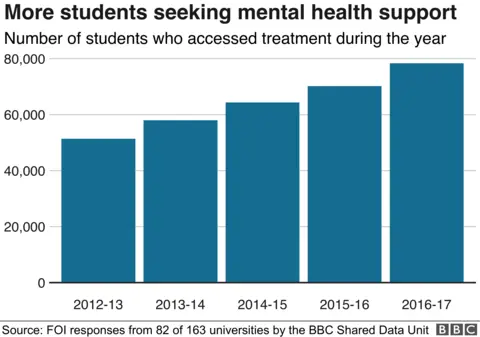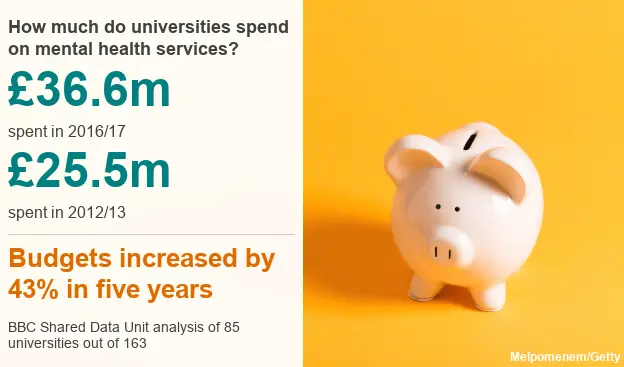More students seek mental health support, analysis shows
 Getty Images
Getty ImagesThe number of students seeking mental health support while studying at university has increased by more than 50% in five years, analysis suggests.
The BBC asked universities across the UK for the numbers of students seeking some form of support.
The National Union of Students said young people were under increasing pressure to perform.
The Department for Education said universities needed to provide pastoral care for students.

In August, a pre-inquest hearing into the death of a vulnerable student at Bristol University heard she did not receive well-being support. Natasha Abrahart, 20, is one of 11 students at the university to die since October 2016.
The university later issued a statement, saying it had made offers of support towards Ms Abrahart.

'There's a lot of shame attached'
Christian Frank, from the University of Birmingham, said: "Universities are just accepted by students to be a hotbed for stress and anxiety. The drinking culture at university allowed me to hide away, numbing my pain and normalising being exhausted in the day and hyperactive at night.
"I'd been ill throughout the course and talked to the extenuating circumstances officer about how many lectures I'd missed but my anxiety was too high to admit that I had a problem.
"By admitting to someone at the university, I'm telling them that I feel like I'm not good enough to finish a course I signed up for. This means there's a lot of shame attached to asking for help."
'Seeking help was not made easy'

Will had gone to university feeling "quite positive" but found his mental health deteriorated during the first term.
He admitted things had been tough, being away from his family, and because he had not immediately "found his feet" by joining societies and making friends.
Will said the idea of seeking help with mental health issues was not easy.
"On the university mental health counselling website there is a form you fill out that ranks your answers from not at all to very likely - there are a lot of very triggering questions.
"[But it] felt like almost immediately you opened it there's less of a chance you are going to get in because there will be people filling it in as 'likely' for every single thing."
Two months after completing the form he was emailed to say he had not been accepted for one-on-one counselling.
"I'm feeling better now but was definitely in a worse place after the experience of not getting help," he said.
"It's something the uni needs to focus on... and make more personal."
'He could very easily have been another'
 Erhui1979/Getty
Erhui1979/GettyKayleigh, from the University of Bristol, said: "A friend of mine was suicidal at uni. We got him referred to the university counselling service but he was on a long waiting list. They suggested he talk to a tutor and maybe if he'd done that he would have got counselling sooner but he was so stressed about the course that he didn't want to. It was really hard to get anyone to take any notice.
"One night he was threatening suicide, I took him to A&E and they sent him home. I didn't know what to do so my mum sent the vice chancellor a very angry email, basically saying, if he dies, it's on your hands. The next day, uni mental health services got in touch and referred him to an emergency external counselling service.
"He ended up dropping out and is much healthier and happier but the uni really should have dealt with it better. Especially since Bristol is in the news about high suicide rates - he could very easily have been another."

Of 83 universities that provided five years of full data from 2012 to 2017, the number of students seeking help rose from 50,900 to 78,100. The number of students going to university dropped slightly over the same period.
At the same time, budgets towards mental health services increased by more than 40%.
Eva Crossan Jory, the NUS Vice President, said: "There is a growth in demand [for mental health services] over the last decade, in part, because the reality of studying in the UK has changed so much.
"Many are balancing work, study and caring responsibilities. With fees so high, and the job market so competitive, students feel they have to continually push themselves, perhaps more so than before."

Universities Minister Sam Gyimah said: "University is supposed to be an assault on the senses. It should be demanding and disorientating, and with that should come adequate pastoral care for students.
"This does not mean mollycoddling or cushioning students from the experiences that are part and parcel of university life, it means making sure support services are available if they need them."
A University of Bristol spokesperson said it had adopted a university-wide approach to identify vulnerable students as early as possible and get them the right support.
If you are struggling with your mental health, you can contact:
- Samaritans free on 116 123 (UK and Ireland) - 24 hours
- Papyrus free on 0800 068 41 41 or text 07786 209697 if you're under 35
- YoungMinds Crisis Messenger text YM to 85258 - Texts are free from some service providers
- Mind information for mental health telephone support

More about this story
The Shared Data Unit makes data journalism available to news organisations across the media industry, as part of a partnership between the BBC and the News Media Association.
For more information on methodology, click here. Read more about the Local News Partnerships here.
Data chart by Daniel Dunford - BBC Data Journalism
Some names have been changed and stories have been edited for readability and to preserve anonymity.
